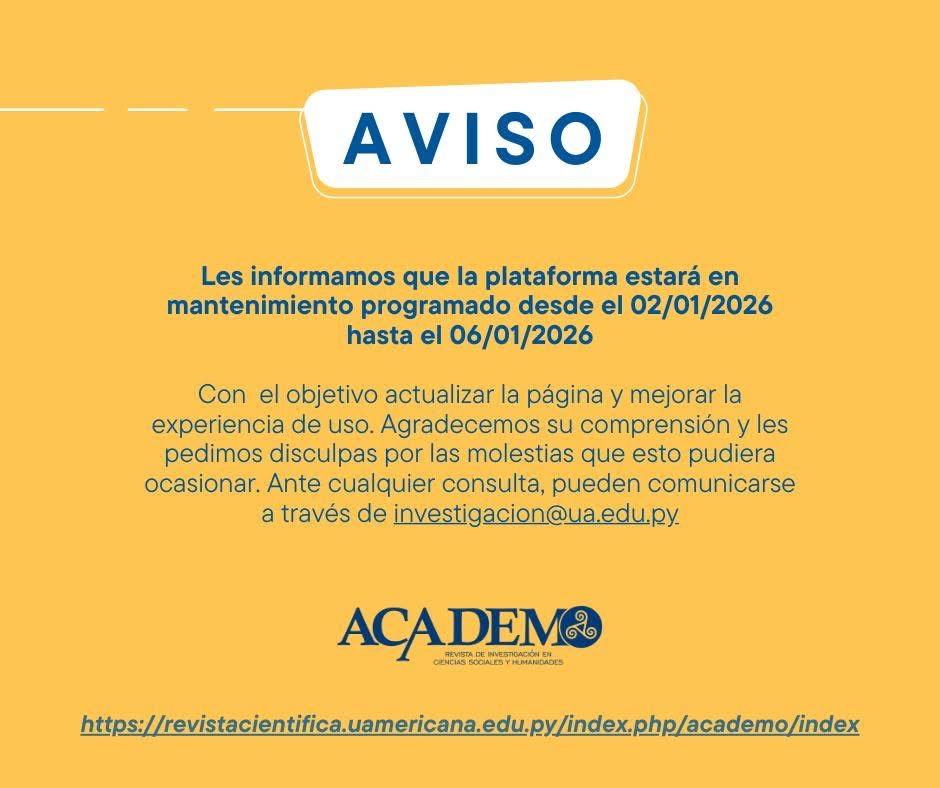Legal implications of annulments in food assistance trials
Keywords:
Procedural acts; nullities; food assistance; children; adolescents; ParaguayAbstract
It is known that the processes in general present multiple nuances, and generate situations that hinder their normal development due to the existence of procedural acts that were carried out in a defective manner, consequently causing requests for their nullity or ineffectiveness. Among the numerous lawsuits are the food assistance lawsuits that are initiated in favor of children and adolescents in the relevant specialized jurisdiction. In many of the food assistance litigation, the magistrates base their decisions on merely formal questions, setting aside the best interests of the child, which has constitutional status, and declare nullity of procedural acts, affecting the recently mentioned principle, damaging the legitimate rights of those people who are in vulnerable situations, such as children and adolescents. The approach to procedural nullities generates a series of effects that affect the rights of the person being fed, prioritizing accessory issues over the main issue, which in this case is the right to feed a minor by those persons who are legally obliged to do so. As a result, this circumstance means that in many cases there is no awareness that such effects have a negative impact, not only on the normal processing of a process, but also on the right to prevail the Best Interest of the Child that the national constitution determines. So much so that in a particular case on Food Assistance and for didactic purposes, this article presents a court ruling where the Court of Appeal –in the best interest of the child– correctly compensated the right of the child or adolescent to be fed by his father, forcing the latter to fulfill his duty to his son, despite the vices of form that the sentence entailed, which could be corrected with the office of the Court. Consequently, I consider that, when making a decision, the Best Interest of the child or adolescent must be taken into account, aiming at the creation of new laws, government policies and budgets for this jurisdiction.
Downloads
References
Bruñol, M. (1999). El interés superior del niño en el marco de la convención internacional sobre los derechos del niño. Recuperado de http://www.iin.oea.org/ IIN/cad/Participación/pdf/el_interes_superior.pdf
Casco Pagano, H. (1997). Código procesal civil, comentado y concordado. Asunción, Paraguay: La Ley paraguaya.
Constitucional Nacional de Paraguay. (1992). Asunción, Paraguay.
Corte Suprema de la República del Paraguay. (2012), Gaceta Judicial Nº 2. Asunción, Paraguay: Intercontinental Editora.
Decreto n° 7351. (2017). Por el cual se dispone el reajuste de los sueldos y jornales mínimos de trabajadores del sector privado. Recuperado de http://www.irunvillamayor.com.py/uploads/legislaciones/decreto-n-7351-reajuste-de-los-sueldos-y-jornales-minimos-de-trabajadores-del-sector-privado.pdf
Fix-Zamudio, H. (1995). Metodología, docencia e investigación jurídica. Buenos Aires, Argentina: Editorial Porrúa.
Ley nº 1680. (2001). Código de la niñez y la adolescencia. Recuperado de https://www.bacn.gov.py/leyes-paraguayas/5261/ley-n-1680-codigo-de-la-ninez-y-la-adolescencia
Maurino, A. (2011). Nulidades procesales (3º ed.). Buenos Aires, Argentina: Astrea.
Palacio, L. E. (1997). Manual de derecho procesal civil (13 ed.). Buenos Aires, Argentina: Abeledo-Perrot.
Pucheta de Correa, A. (2001). Manual de derecho de la niñez y la adolescencia. Asunción, Paraguay: Ediciones de la Universidad del Pacífico.
Rodríguez, S. (2009). Código de la Niñez y la Adolescencia, Procedimiento General, Caracteres, principios y estructura. Asunción: Intercontinental Editora.
Published
How to Cite
Issue
Section
License
Copyright (c) 2021

This work is licensed under a Creative Commons Attribution 4.0 International License.







